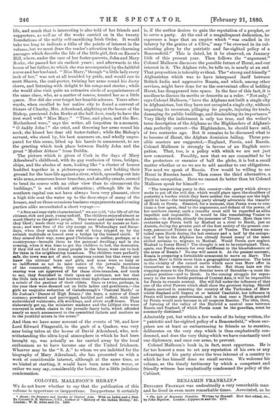COLONEL MA.LLESON'S HERAT.*
WE do not know whether to say that the publication of this volume is opportune or inopportune. Inopportune it certainly * Herat: the Granary and Garden of Central Aria. With an Index and s Map. By Colonel G. B. Wiesen. 0.8.1., Author of "History of the Indian Mutiny," &o. London : W. H. Allen and Co. 1880.
is, if the author desires to gain the reputation of a prophet, or' to serve a party. At the end of a magniloquent dedication, he expresses a hope that an empire which "was cradled in its infancy by the genius of a Clive," may "be crowned in its cul- minating glory by the patriotic and far-siglited policy of a Beaconsfield." This is dated, let it be observed, on January 15th of this present year. Then follows the "argument." Colonel Malleson discusses the possible future of Herat, and our interest in it. The Afghan rule, he tells us, is nearly at an end That proposition is tolerably evident. The" strong and friendly Afghanistan which was to have interposed itself between British India and aggressive Russia, and which, among other services, might have done for us the convenient office of holding Herat, has disappeared into space. In the face of this bet, it is needless to discuss its merits or demerits as a ruler. "Not only,' says Colonel Malleson," have the Afghans not built a single city in Afghanistan, but they have not occupied a single city, without impairing its resources, pillaging its people, injuring its trade, damaging its public buildings, and diminishing its importance.' Very likely the indictment is only too true, and the writer's terse description of the Afghans as the Highlanders of Afghani- stan perfectly correct—the Highlanders, he should have said, of two centuries ago. But it remains to be discussed what is to become of Herat, the Afghan dominion failing. Three pos- sible masters are suggested,—England, Persia, and Russia.
Colonel Malleson is strongly in favour of an English occu- pation. That, too, is a policy with which we are not just now concerned. Possibly, now that we are committed to be the protectors or enemies of half the globe, it is but a small matter whether or no we are to add another to our obligations.
Nor need we speak of Russia. Few would be willing to see Herat in Russian hands. Then comes the third alternative, a Persian occupation. Here we cannot do better than let Colonel Malleson speak for himself :—
"The temporising party in this country—the party which always seeks to put off the evil day, which would place upon the shoulders of posterity a burden which they have neither the courage nor the high spirit to bear—the temporising party already advocates the transfer of Herat to Persia. Granted, for a moment, that Persia were to con- tinue a free agent, deaf to the arguments, and defiant of the power, of her northern enemy, such a transfer must still be regarded as alike impolitic and impossible. It would be like transferring Venice to Austria,—to Austria, already the possessor of Trieste. More than two centuries ago Persia built up Mashed as a rival to Hera, just as Austria, during the greater part of the first moiety of the present cen- tury, patronised Trieste at the expense of Venice. The misery en- tailed upon Heriit during the last century and a half by the occupa- tion of her by the Afghans has already foroed many of the most skilled artisans to migrate to Mashed. Would Persia now neglect Mashed to foster Heriit ? The thought is not to be entertained. Then, again, can Persia remain for ever indifferent to the blandishments or the arms of Russia ? No one will assert it. At the present moment, Russia is preparing a formidable armament to move on Merv. The. modern Mery is little more than a geographical expression. The huts in the vicinity of the ruined castle which once was Mery offer in themselves no temptation to an invader. But those hats are the stepping-stones to the Persian frontier town of Sarrakhs—a most im- portant position—and to Merit. In the coming struggle for supre- macy in the most fertile portions of Central Asia, it will be impossible for Persia to remain neutral. She will fall under the influence of that one of the rival Powers which shall show the greatest daring. Should Russia succeed in annexing the country of the Trirkmins of Mery whilst England still lingers at or behind Candahar, her influence in Persia will become predominant, and in that ease a Merit guarded by Persia would soon become in all respects Russian. The idea, then, of forming of the valley of the Heririld a neutral zone between Russia and England, of which Persia must be the guardian, must be summarily dismissed."
Admirably put, but within a few weeks of its being written, the "patriotic and far-sighted policy of a Beaconsfield," whose sur- prises are at least as embarrassing to friends as to enemies, deliberates on the very step which is thus emphatically con- demned, and does the very thing which we have constantly used our diplomacy, and once our arms, to prevent.
Colonel Malleson's book is, in fact, most opportune. He is far too honest a man to set any reputation of his own or any advantage of his party above the true interest of a country to which he has himself done no small service. We welcome his volume, as the timely testimony by which a competent and friendly witness has emphatically condemned the policy of the Cabinet.


































 Previous page
Previous page